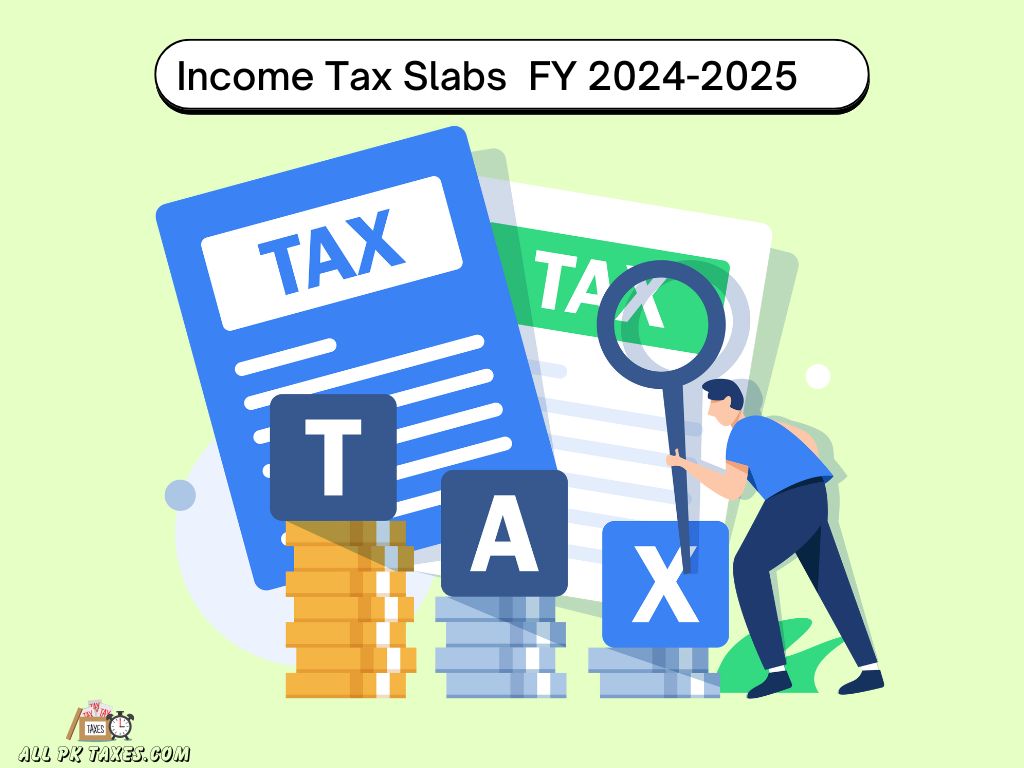The Government of Pakistan has recently introduced new tax slabs for salaried individuals for the fiscal year 2024-2025 through the Finance Act 2024. This move reflects the increasing financial pressure on salaried individuals in an already inflation-stricken economy. Below, we delve into the latest tax structure, comparisons with the previous fiscal year, and the implications for taxpayers.
Updated Tax Slabs for Salaried Individuals: FY 2024-2025

The government has maintained six tax slabs while increasing the tax burden for certain income groups. Here is the updated breakdown:
| Taxable Income | Rate of Tax |
|---|---|
| Where taxable income does not exceed Rs. 600,000 | 0% |
| Where taxable income exceeds Rs. 600,000 but does not exceed Rs. 1,200,000 | 5% of the amount exceeding Rs. 600,000 |
| Where taxable income exceeds Rs. 1,200,000 but does not exceed Rs. 2,200,000 | Rs. 30,000 + 15% of the amount exceeding Rs. 1,200,000 |
| Where taxable income exceeds Rs. 2,200,000 but does not exceed Rs. 3,200,000 | Rs. 180,000 + 25% of the amount exceeding Rs. 2,200,000 |
| Where taxable income exceeds Rs. 3,200,000 but does not exceed Rs. 4,100,000 | Rs. 430,000 + 30% of the amount exceeding Rs. 3,200,000 |
| Where taxable income exceeds Rs. 4,100,000 | Rs. 700,000 + 35% of the amount exceeding Rs. 4,100,000 |
Key Changes
- An increased tax rate of 5% is now applicable to individuals earning between Rs. 600,000 and Rs. 1,200,000 annually.
- Tax obligations for higher income brackets have also risen, placing additional strain on those with earnings above Rs. 4,100,000.
Comparison with Previous Fiscal Year’s Tax Slabs
The fiscal year 2023-2024 offered some relief compared to the current structure. The comparison highlights the increased tax burden:
| Taxable Income | Rate of Tax (FY 2023-2024) |
|---|---|
| Where taxable income does not exceed Rs. 600,000 | 0% |
| Where taxable income exceeds Rs. 600,000 but does not exceed Rs. 1,200,000 | 2.5% of the amount exceeding Rs. 600,000 |
| Where taxable income exceeds Rs. 1,200,000 but does not exceed Rs. 2,400,000 | Rs. 15,000 + 12.5% of the amount exceeding Rs. 1,200,000 |
| Where taxable income exceeds Rs. 2,200,000 but does not exceed Rs. 3,600,000 | Rs. 165,000 + 22.5% of the amount exceeding Rs. 2,400,000 |
| Where taxable income exceeds Rs. 3,200,000 but does not exceed Rs. 6,000,000 | Rs. 435,000 + 27.5% of the amount exceeding Rs. 3,600,000 |
| Where taxable income exceeds Rs. 6,000,000 | Rs. 1,095,000 + 35% of the amount exceeding Rs. 6,000,000 |
Impact on Salaried Individuals
Increased Tax Liability
Salaried individuals earning between Rs. 600,000 and Rs. 1,200,000 annually will now face a doubling of their tax obligations under the new regime, as the rate has risen from 2.5% to 5%.
For instance:
- Earnings of Rs. 1,000,000/year (Rs. 83,333/month):
- FY 2023-2024: Tax = Rs. 10,000
- FY 2024-2025: Tax = Rs. 20,000
High Earners Most Affected
The new tax slabs disproportionately affect individuals with taxable incomes exceeding Rs. 6,000,000 annually:
- For an individual earning Rs. 12 million/year (Rs. 1 million/month), the tax obligation rises by Rs. 22,000.
Middle-Income Groups
A person earning Rs. 100,000/month will see their tax liability increase from Rs. 1,250 to Rs. 2,500 monthly. This highlights the rising pressure on middle-income groups, who already struggle to cope with inflation.
Understanding the Finance Act 2024’s Implications
The tax exemption threshold remains Rs. 600,000 annually (Rs. 50,000/month). While this provides relief to low-income earners, it does little to alleviate the broader financial pressures faced by other groups.
The government has justified these increases as necessary for revenue generation amidst mounting fiscal deficits and commitments to international financial institutions. However, it has sparked widespread debate about its fairness and long-term economic impact.
Why Filing Taxes is Essential
While the new tax regime places a heavier burden on salaried individuals, filing taxes offers significant benefits:
- Compliance with Laws: Avoid legal penalties by staying compliant with national tax laws.
- Eligibility for Financial Benefits: Gain access to rebates, loans, and subsidies available only to registered taxpayers.
- Social Contribution: Taxes fund essential services like healthcare, education, and infrastructure.

